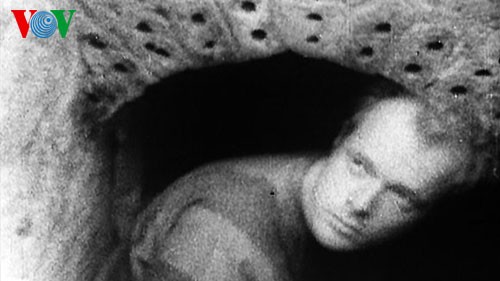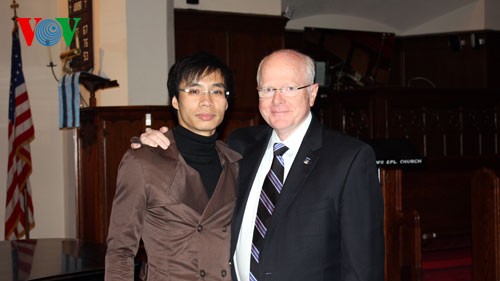(VOVworld) – The horrific night of December 18, 1972, one of the worst moments in the history of the US Air Force, has haunted 65- year-old priest Robert Certain. Each image, spoken word and action of that night are as fresh in his memory as if they occurred yesterday. That night dramatically changed the life of the navigation officer of the first B52 bomber shot down in Hanoi during the 12 days and nights of US carpet bombing. VOV’s US correspondents Nhat Quynh and Huy Hoang tell the American aviator’s story.
 |
| Navigator Robert Certain in a bomb shelter |
Robert Certain was born in 1947 in Georgia, the US. After graduating college, he was recruited to the US Air Force and became a navigation officer for B52 strategic bombers or Stratofortress bombers, which the US proudly described as invincible. Certain was sent to Vietnam and ordered to fly on the first day of the shameful carpet bombing dubbed Linebacker II at the end of December 1972. Though believing in the invincibility of the world’s then most advanced bomber, the 25 year-old navigator felt am ambiguous fear during his 8-hour flight from the Pacific island of Guam to his target in Hanoi. On the ground, a swarm of SAM2 surface-to-air rockets and MIG fighters stood ready to defend Hanoi. Above all, Certain was facing courageous and indomitable people, who had never yielded to any foreign invader. He told VOV: “As we approached the target, at about 15 seconds before our bombs were scheduled to be released, we opened the bomb bay doors, and about 5 seconds later, we were struck by two surface-to-air missiles SA2s. And of course the missile doesn’t hit the airplane – they blow up and the airplane flies through all the shrapnel so we lost several engines, perhaps 4 on the left side of the aircraft, we had two crew members who were mortally wounded by shrapnel from the SAM strikes. We were on fire. The chance of explosion was significantly high at that point, and we began our ejection sequence.”
Ejecting from his B52 bomber, which was out of control, Certain parachuted into a newly-ploughed field near a dry canal. As soon as he touched the ground, the American officer was detected by a woman. For a short while, furious villagers packed the field. Certain thought his end has come. To his surprise, his adversaries treated with mercy those who killed their people and destroyed their country: “Well, as you might imagine, the civilians in the community were not really happy with me for dropping in on them unannounced, as we say. But the militia protected me. I was searched and was taken into a kind of a community building, where one of the officials of the community was writing down information from my ID card and my dog tag. The civilians were kept outside, they were not hostile. There were wooden bars on the windows… The militia men inside the building took some tables and leaned them up against the window to prevent anything from being thrown in at me. We were put on a truck and then moved from the village into the city across, a ferry across the Red river, and into the Hanoi Hilton, the Hoa Lo prison. I was prepared to be tortured, I was not. I was concerned first of all that I would be pressed or even tortured to give up information, I was not.”
Certain was imprisoned for 100 days in Hanoi before he was freed in a prisoner exchange under the 1973 Paris Accord. Certain returned home with the psychological scars that most American war veterans suffered: “I call it the ghost of Christmas past. When soldiers go into combat and come home again, we ‘ve all changed. Combatants see things that civilians’ God willing. They ‘ve seen their friends die, or they have killed other people. And for people growing up being told by their parents not to hurt their brothers, and sisters and their neighbors, not to break their toys or damage their property. Ah.., when we go into war, that’s exactly what we’re expected to do. We’re expected to hurt and to kill. We’re expected to destroy property in order to win the political goals of the governments. I know that my actions resulted in the death of hundreds of north Vietnamese soldiers and perhaps some other innocent civilians. And so we come back with this what I would call ‘moral disconnect…”
Back in the US, Certain spent 3 years studying at a theological school and became a priest, which he says in order to perform penance and redeem his mistakes. Certain believes that the war in Vietnam helped him contemplate life and learn more about human relationships and humanity. He is now planning to revisit Vietnam to see how peace has been restored there.
 |
| Robert Certain poses with VOV US correspondent Nhat Quynh |